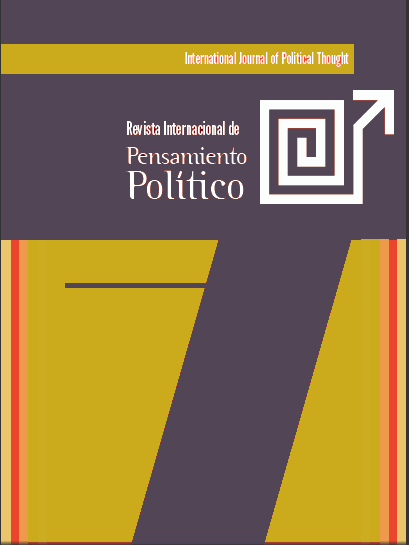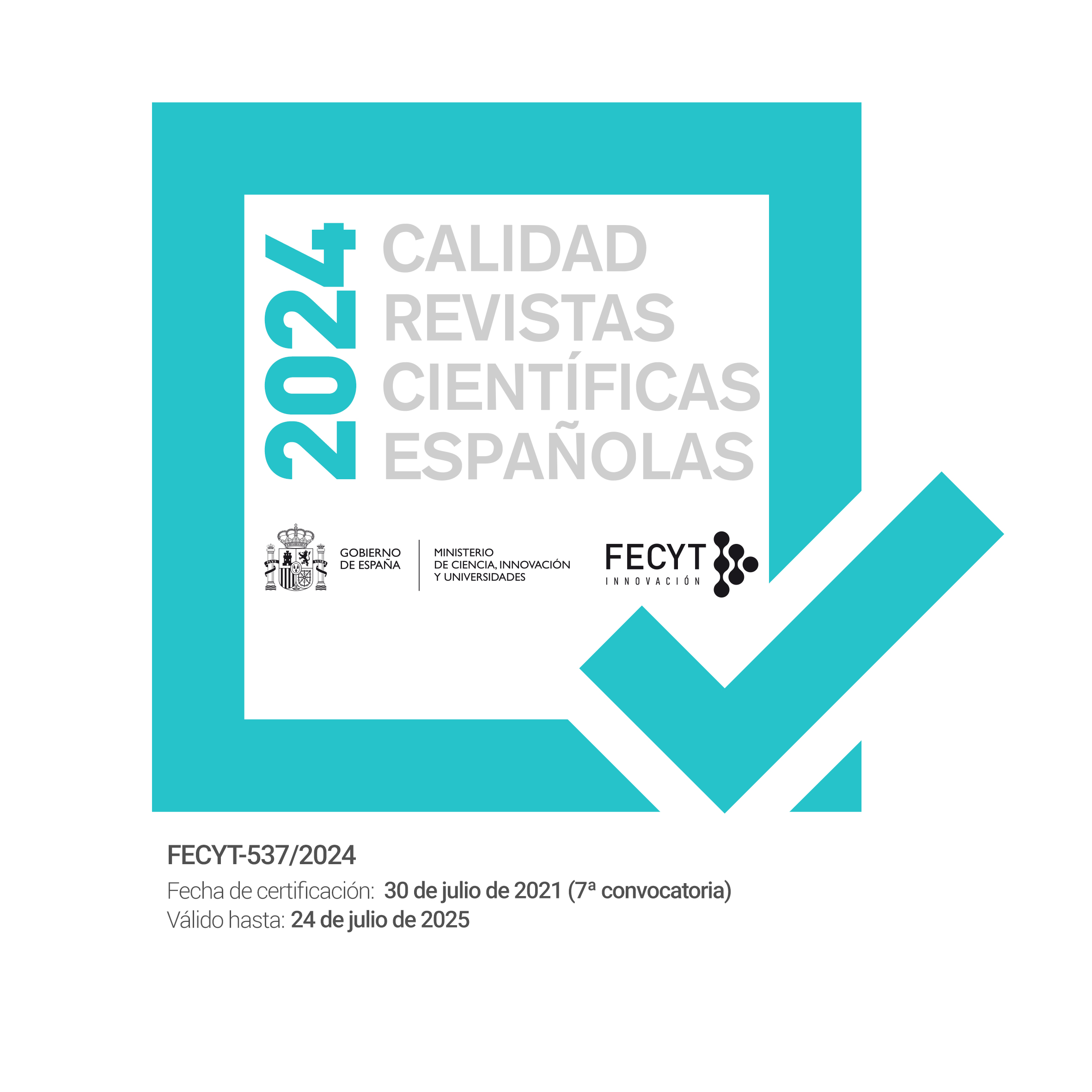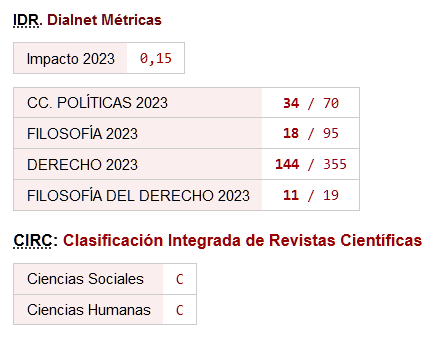«Strangle the tiger». Radicalization and growth of political violence in European Far-Right
the cases of Greece and United Kingdom
DOI:
https://doi.org/10.46661/revintpensampolit.10947Keywords:
far-right, radicalization, political violence, violent protestAbstract
This article analyzes from an interdisciplinary perspective the processes of violent radicalization in which the far-right is immersed, combining the critique of political economy, especially due to the windows of opportunity generated by the current capitalist crisis, with elements from political science and of behavioral sociology. First, the article studies the transformation of social norms that legitimize the use of political violence in the far-right as a legitimate means (and as an end) from a macro, meso and micro perspective, as well as the different degrees of violent radicalization. Next, political violence in the contemporary far-right is reviewed, focusing on violent protest. The third section comparatively analyzes two cases that, although presenting differences between them, are characterized by the highest rates of far-right political violence in Europe: Greece and the United Kingdom. All of this accounts for the transformation of the social bases of the hegemonic radical right towards more extreme positions closer to classical fascism in terms of ideology, methods and objectives.
Downloads
References
Alcalde, Á. (2016). “La tesis de la brutalización (George L. Mosse) y sus críticos: un debate historiográfico”, Pasado y Memoria. Revista de Historia Contemporánea, vol. 15, pp. 17-42. https://doi.org/10.14198/PASADO2016.15.01 DOI: https://doi.org/10.14198/PASADO2016.15.01
Allchorn, W. & Dafnos, A. (2020). “Far-Right Mobilisations in Great Britain: 2009-2019”, CARR FRGB Dataset Research Report 2020
Antón-Mellón, J., & Parra, I. (2015). “Concepto de radicalización”, en J. Antón-Mellón (Ed.), Islamismo yihadista. Radicalización y contrarradicalización. Valencia: Tirant Lo Blanch, pp. 17-37
Antón-Mellón, J. & Seijo Boado, I. (2024). La nostalgia fascista del futuro. La derecha radical europea. Barcelona: Icaria
Ayers, A. J. (2023). “‘The Fire This Time’: The Long Crisis of Neoliberal Capitalist Accumulation and Spectre of Neofascism”. Critical Sociology, vol. 50(3), pp. 413-435. https://doi.org/10.1177/08969205231195229 DOI: https://doi.org/10.1177/08969205231195229
Betancor, V., Leyens, J. P., Rodríguez, A., & Quiles, M. N. (2003). “Atribución diferencial al endogrupo y al exogrupo de las dimensiones de moralidad y eficacia: un indicador de favoritismo endogrupal”. Psicothema, vol. 15(3), pp. 407-413
Bjørgo, T., & Aasland Ravndal, J. (2019). “Extreme-right violence and terrorism: Concepts, patterns, and responses”. ICCT Policy Brief
Blanco Navarro, J. M. (2020). “Delito de odio. El ‘hermano pequeño’ del terrorismo de extrema derecha”, en A. M. González, J. A. López-Ruiz, & M. P. García, Seguridad ciudadana, desviación social y sistema judicial. Madrid: Dykinson, pp. 93-102. https://doi.org/10.2307/j.ctv1ks0ds7.11 DOI: https://doi.org/10.2307/j.ctv1ks0ds7.11
Carretero, N., & Lezcano, A. (20 de enero de 2024). “Terror invisible: así es la nueva ola de ultraderecha que defiende pasar a la acción”.
El País. Disponible en: https://elpais.com/eps/2024-01-20/terror-invisible-asi-es-la-nueva-ola-de-ultraderecha-que-defiende-pasar-a-la-accion-terrorista.html
Casals, X. (2003). Ultrapatriotas. Extrema derecha y nacionalismo de la guerra fría a la era de la globalización. Barcelona: Crítica
Castelli Gattinara, P., & Beau, I. (2024). “The Comparative Far-Right Protest Project”. Peril/C-Rex Webinar Series. Researching the Far-Right: Methods and Ethics. Disponible en: https://www.sv.uio.no/c-rex/english/news-and-events/events/webinar/webinar-methods-ethics/2024-02-22-measuring-far-right-protest-mobilisation.html
Castelli Gattinara, P., Froio, C., & Pirro, A. L. (2022). “Far‐right protest mobilisation in Europe: Grievances, opportunities and resources”. European Journal of Political Research, vol. 61(4), pp. 1019-1041. https://doi.org/10.1111/1475-6765.12484 DOI: https://doi.org/10.1111/1475-6765.12484
Cleland, J. (2020). “Charismatic leadership in a far-right movement: an analysis of an English Defence League message board following the resignation of Tommy Robinson”. Social Identities, vol. 26(1), pp. 48-60. https://doi.org/10.1080/13504630.2019.1671182 DOI: https://doi.org/10.1080/13504630.2019.1671182
Collins, R. (2013). “Entering and leaving the tunnel of violence: Micro-sociological dynamics of emotional entrainment in violent interactions”. Current Sociology, vol. 61(2), pp. 132-151. https://doi.org/10.1177/0011392112456500 DOI: https://doi.org/10.1177/0011392112456500
Copsey, N. (2010). The English Defence League: Challenging our country and Values of Social Inclusion, Fairness and Equality. London: Faith Matters
Corradi, C. (2020). Sociología de la violencia. Identidad, modernidad, poder. Zaragoza: Prensas de la Universidad de Zaragoza
Daniels, L.-A., & Vlaskamp, M. (2021). Violencia política: hacia una comprensión compleja del fenómeno. Madrid: Tecnos
Della Porta, D. (1995). Social movements, political violence and the State: a comparative analysis of Italy and Germany. Cambridge: Cambridge University Press. https://doi.org/10.1017/CBO9780511527555 DOI: https://doi.org/10.1017/CBO9780511527555
Dinas, E. M. (2019). “Waking up the golden dawn: does exposure to the refugee crisis increase support for extreme-right parties?”. Political analysis, vol. 27(2), pp. 244-254. https://doi.org/10.1017/pan.2018.48 DOI: https://doi.org/10.1017/pan.2018.48
Elizalde, R. M. (2021). “El asalto al Capitolio de Washington, crónica de la violencia anunciada”. Revista Política Internacional, vol. 3(2), pp. 43-54
Forti, S. (2021). Extrema derecha 2.0. Qué es y cómo combatirla. Madrid: Siglo XXI Editores
Friberg, D. (25 de julio de 2015). “Låt äventyret börja”. Motpol. Metapolitik för 20-Talet. Disponible en: https://motpol.nu/danielfriberg/2015/07/25/lat-aventyret-borja/
García-Magariño, S. (2022). Violencia, política y religión. Una teoría general de la radicalización violenta. Madrid: Catarata
Georgiadou, V. (2013). “Right-Wing Populism and Extremism: The Rapid Rise of ‘Golden Dawn’ in Crisis-Ridden Greece”, en R. Melzer, & S. Serafin, Right-Wing Extremism in Europe. Berlin: Friedrich-Ebert-Stiftung, pp. 75-103
Goldstein, A. (2021). “Right-wing opposition to the mainstream radical right: the cases of Hungary and Poland”. Journal of Contemporary Central and Eastern Europe, vol. 29, pp. 23-40. https://doi.org/10.1080/25739638.2021.1957483 DOI: https://doi.org/10.1080/25739638.2021.1957483
Hall, S. (1979). “The Great Moving Right Show”. Marxism Today, pp. 14-20
Hobsbawm, E. (1999). “Las reglas de la violencia”, en E. Hobsbawm, Gente poco corriente. Resistencia, rebelión y jazz. Barcelona: Crítica, pp. 193-198
Huddy, L. (2001). “From social to political identity: A critical examination of social identity theory”. Political psychology, vol. 22(1), pp. 127-156. https://doi.org/10.1111/0162-895X.00230 DOI: https://doi.org/10.1111/0162-895X.00230
Jupskås, A. R., & Fielitz, M. (2022). “Far-Right Violence in Greece in Comparative Perspective”. Journal of Modern Greek Studies, vol. 40, pp. 95-115. https://doi.org/10.1353/mgs.2022.0012 DOI: https://doi.org/10.1353/mgs.2022.0012
Kalmoe, N. P., & Mason, L. (2022). Radical American Partisanship. Mapping Violent Hostility, Its Causes and the Consecuences for Democracy. Chicago & London: The University of Chicago Press. https://doi.org/10.7208/chicago/9780226820279.001.0001 DOI: https://doi.org/10.7208/chicago/9780226820279.001.0001
Kalyvas, S. (2010). La lógica de la violencia en la guerra civil. Madrid: Akal
Leoni, F. (2022). Fascistas made in USA. Barcelona: El Viejo Topo
Leser, J., & Spissinger, F. (2020). “The functionality of affects: conceptualising far-right populist politics beyond negative emotions”. Global Discourse, vol. 10(2), pp. 325-342. https://doi.org/10.1332/204378919X15762350844101 DOI: https://doi.org/10.1332/204378919X15762350844101
Macklin, G. (2022). “‘Praise the saints’: The cumulative momentum of transnational extreme-right terrorism”, en J. Dafinger, & M. Florin, A Transnational History of Right-Wing Terrorism. Political Violence and the Far-Righ in Eastern and Western Europe since 1900. London: Routledge, pp. 215-241. https://doi.org/10.4324/9781003105251-16 DOI: https://doi.org/10.4324/9781003105251-16
Malešević, S. (2020). El auge de la brutalidad organizada. Una sociología histórica de la violencia. Valencia: Publicacions de la Universitat de València
Malthaner, S. (2017). “Radicalization: The evolution of an analytical paradigm”. European Journal of Sociology/Archives Européennes de Sociologie, vol. 58(3), pp. 369-401. https://doi.org/10.1017/S0003975617000182 DOI: https://doi.org/10.1017/S0003975617000182
Mau, S. (2023). Compulsión muda. Una teoría del poder económico del capital. Madrid: Ediciones Extáticas
Millán, E. (7 de agosto de 2024). “La convocatoria hoy de 30 manifestaciones antiinmigración eleva la tensión en el Reino Unido”. El País. https://elpais.com/internacional/2024-08-07/la-convocatoria-hoy-de-30-manifestaciones-antiinmigracion-eleva-la-tension-en-el-reino-unido.html
Miller, L. (2023). Polarizados. La política que nos divide. Madrid: Deusto
Mondon, A., y Winter, A. (2023). La democracia reaccionaria. La hegemonización del racismo y la ultraderecha populista. Madrid: Ediciones Morata
Mudde, C. (2021). La ultraderecha hoy. Barcelona: Paidós
Olascoaga, O. G. (2018). “Presencia del neofascismo en las democracias europeas contemporáneas”. REIS: Revista Española de Investigaciones Sociológicas, vol. 162, pp. 3-20
Ortiz, R. D. (2022). “El terrorismo de extrema derecha: concepto, tipología y perspectivas”. Cuadernos de estrategia, vol. 214, pp. 185-200
Paxton, R.O. (2019). Anatomía del fascismo. Madrid: Capitán Swing
Pearson, E. (7 de agosto de 2024). “Britain disoder: Why we need to take Far Right violence more seriously”. International Center for Counter-Terrorism. https://www.icct.nl/publication/british-disorder-why-we-need-take-far-right-violence-more-seriously
Peregil, F. & Arbide, H. (27 de junio de 2023). “Inmigrantes que ‘diluyen la identidad helena’ y neutralidad en Ucrania: así es el ideario del grupo ultra que irrumpe en el Parlamento griego”. Disponible en: https://elpais.com/internacional/2023-06-27/inmigrantes-que-diluyen-la-identidad-helena-y-neutralidad-en-ucrania-asi-es-el-ideario-del-grupo-ultra-que-irrumpe-en-el-parlamento-griego.html
Piqueras, A. (2022). De la decadencia de la política en el capitalismo terminal. Barcelona: El Viejo Topo
Renton, D. (2019). The New Authoritarians. Convergence on the Right. London: Haymarket Books
Richardson, J. E. (2013). “Ploughing the Same Furrow? Continuity and Change on Britain’s Extreme-Right Fringe”, en R. Wodak, M. KhosraviNik & B. Moral (Ed.), Right-Wing Populism in Europe. Politics and Discourse. London: Bloomsbury, pp. 105-119. https://doi.org/10.5040/9781472544940.ch-007 DOI: https://doi.org/10.5040/9781472544940.ch-007
Rori, L., Georgiadou, V., & Roumanias, C. (2022). “Political Violence in Crisis-Ridden Greece: Evidence from the Far Right and the Far Left”. Journal of Modern Greek Studies, vol. 40(1), pp. 1-37. https://doi.org/10.1353/mgs.2022.0009 DOI: https://doi.org/10.1353/mgs.2022.0009
Saull, R. (2023a). Capital, Race and Space Volume 1. The Far-Right from Bonapartism to Fascism. Leiden: Brill. https://doi.org/10.1163/9789004535176_002 DOI: https://doi.org/10.1163/9789004535176_002
Saull, R. (2023b). Capital, Race and Space Volume 2. The Far-Right from “Post-Fascism” to Trumpism. Leiden: Brill. https://doi.org/10.1163/9789004539549 DOI: https://doi.org/10.1163/9789004539549
Solano, L. G., & Elvira, D. A. (2024). “Crisis capitalista, giro penal del Estado y ultraderecha. Apuntes desde la crítica de la economía política”. Hastapenak: Revista de Historia Contemporánea y Tiempo Presente-Gaurko Historiaren Aldizkari Kritikoa, vol. 7, pp. 48-83
Smith, H. (8 de octubre de 2020). “‘Nadie sabe cuántos asesinatos cometieron’: hablan las víctimas del grupo neonazi Amanecer Dorado”. Eldiario.es. Disponible en: https://www.eldiario.es/internacional/nadie-asesinatos-cometieron-hablan-victimas-grupo-neonazi-amanecer-dorado_1_6279546.html
Tilly, C. (2007). Violencia colectiva. Madrid: Hacer
Valentim, V. (2021). “Parliamentary representation and the normalization of radical right support”. Comparative political studies, vol. 54(14), pp. 2475-2511. https://doi.org/10.1177/0010414021997159 DOI: https://doi.org/10.1177/0010414021997159
Vasilopoulou, S., & Halikiopoulou, D. (2015). The Golden Dawn’s ‘Nationalist Solution’. Explaining the Rise of the Far Right in Greece. New York: Palgrave. https://doi.org/10.1057/9781137535917 DOI: https://doi.org/10.1057/9781137535917
Worth, O. (2019). Morbid Symptoms. The Global Rise of the Far-Right. London: Zed Books
Worth, O. (2022). “The great moving Boris show: Brexit and the mainstreaming of the far-right in Britain”. Globalizations, vol. 20(5), pp. 814-828. https://doi.org/10.1080/14747731.2021.2025291 DOI: https://doi.org/10.1080/14747731.2021.2025291
Downloads
Published
How to Cite
Issue
Section
License
Copyright (c) 2024 Lorién Gómez Solano, Ismael Seijo Boado

This work is licensed under a Creative Commons Attribution-NonCommercial-ShareAlike 4.0 International License.
Open access policy
Free and open access is allowed to any interested party to all the contents of the journal issues, free of charge, being able to print and transfer all the articles, with the only condition of specifying the source and authorship.
The journal: a) does not charge authorship costs for the processing of articles or for their submission, b) maintains copyright for authors without restrictions, c) facilitates authors to keep their publication rights without limitations.
The International Journal of Political Thought is an original work of the Laboratory of Political Ideas and Practices of the Pablo de Olavide University. All articles included in the Journal are original work of their respective authors. This Journal is freely offered to the scientific and academic community at no cost and releases the contents according to the license "Attribution-NonCommercial-ShareAlike 4.0 CC BY-NC-SA" of the Creative Commons project available in the following url: https://creativecommons.org/licenses/by-nc-sa/4.0/legalcode
If you wish to translate or compile any of the articles available here, please contact us at contacto













 ISSN: 1885-589X
ISSN: 1885-589X  Universidad Pablo de Olavide
Universidad Pablo de Olavide